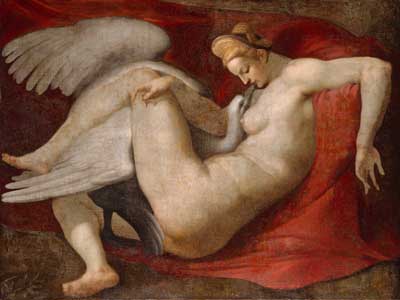
Leda and the Swan, Michelangelo, 1530/<a href="http://commons.wikimedia.org/wiki/File:Leda.jpg">Wikimedia</a>
I suppose it’s pointless to continue engaging in this argument, but a few weeks ago I wrote a post about atheism that keyed off an essay by David Bentley Hart. Damon Linker responds today:
What’s most disappointing is Drum’s failure to grasp the culminating point of Hart’s essay, which, as I take it, is this: the statements “godlessness is true” and “godlessness is good” are distinct propositions. And yet the new atheists invariably conflate them. But a different kind of atheism is possible, legitimate, and (in Hart’s view) more admirable. Let’s call it catastrophic atheism, in tribute to its first and greatest champion, Friedrich Nietzsche, who wrote in a head-spinning passage of the Genealogy of Morals that “unconditional, honest atheism is … the awe-inspiring catastrophe of two-thousand years of training in truthfulness that finally forbids itself the lie involved in belief in God.” For the catastrophic atheist, godlessness is both true and terrible.
….Yet the new atheists seem steadfastly opposed even to entertaining the possibility that there might be any trade-offs involved in breaking from a theistic view of the world. Rather than explore the complex and daunting existential challenges involved in attempting to live a life without God, the new atheists rudely insist, usually without argument, that atheism is a glorious, unambiguous benefit to mankind both individually and collectively.
But this is what I said toward the end of my original post:
Later in the essay, [Hart suggests] that the New Atheists haven’t truly grappled with what a world without religion would be like. And perhaps they haven’t. But interior passions and social mores work both ways. Did Isaac Newton feel a deeper aesthetic connection with the infinite when he was inventing calculus or when he was absorbed in Christian mysticism? Who can say? Not me, surely, and not Hart either. Likewise, the question of whether Christianity has, on balance, been a force for moral good is only slightly more tractable. Does keeping the servants from stealing the silver really outweigh the depredations of the Crusades and the Inquisition?
This is, obviously, just a throwaway paragraph in a blog post, not a long essay in First Things, but I plainly did entertain the possibility of tradeoffs. In fact, my own view is that the net impact of religion on human civilization has probably been zero: we would have developed all the same moral intuitions without it, but on the other hand, we also would have waged all the same wars. If religion hadn’t been the excuse, something else would have been. And generally speaking, religious art and secular art have always struck me as about equally powerful.
Now, when Linker says that atheists refuse to entertain the possibility of tradeoffs, he had mostly transitioned to talking about guys like Richard Dawkins and Christopher Hitchens, not me. Still, he started with me, and he ought to at least acknowledge what I said. There are, quite plainly, tradeoffs involved both in religious beliefs and their lack.
But there’s probably little chance of discussing this profitably, and not because of any absence of good faith on either side. It’s just that the prospect of a Godless world is more salient for some than for others. Nietzche wrote about this in the broader cultural sense above, and Linker talks about it later in the personal sense: “There are no disappointments recorded in the pages of [New Atheist] books, no struggles or sense of loss. Are they absent because the authors inhabit an altogether different spiritual world than the catastrophic atheists?” Speaking for myself: yes. I have never in my life felt the need to believe in God, and that lack simply doesn’t inspire any emotional resonance in me. I don’t know why this is, but I do know that I don’t feel empty inside, I’m perfectly capable of feeling wonder and awe, and there’s no sense of loss or anything else involved in any of this. Linker might regard that as unfathomable, finding the tortured brooding of the catastrophic atheist more to his liking, but it’s so. And I have no idea how you discuss this. Linker feels the pull of the supernatural and I don’t, and all the conversation in the world won’t change that or make it any more explicable.
But 2,000 years from now we’ll probably still be talking about it anyway.

















